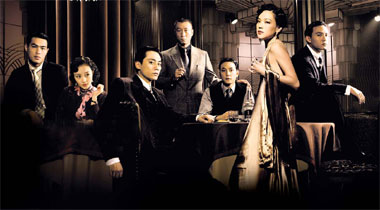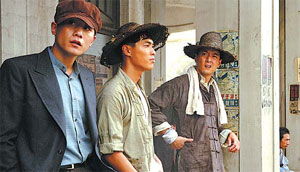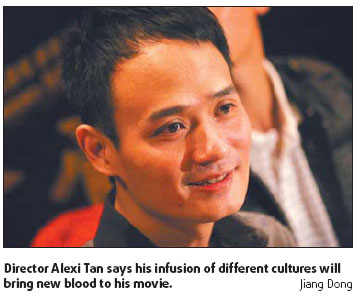Wooing them by himself
Alexi Tan is known as the apprentice of world-acclaimed action director John Woo, but Tan is quick to defend the originality of his new film, a Shanghai gangster flick Blood Brothers (Tiantang Kou). "This is not a remake of John Woo's Bullet in the Head (Diexue Jietou)," says Tan. "Woo's work is only one of my inspirations."
 |
| Blood Brothers stars A-listers including Liu Ye (third from left) and Daniel Wu (third from right). |
Woo, who won the world recognition with major hits including Face Off and Mission Impossible II, says he took the role as the producer of the film "to help a young man".
Woo helped Tan build up his dream cast, including Liu Ye, Daniel Wu and Chang Chen, A-listers from the mainland, Hong Kong and Taiwan respectively.
Young and talented, with novel ideas and confidence to make them happen, Tan says the film started developing three years ago when he met Terence Chang, an old partner of Woo. Tan was then a rising commercial director working in New York. A 15-minute MV he made for Taiwan singer Jay Chou impressed Chang, who soon recommended a reel of Tan's clips to Woo.
"Every single commercial on the reel told a vivid story within the 30 to 60-second time frame," Woo recalls. "The shots were very fluid and visually stunning. I felt that this director had a lot of potential."
When Woo was in the hospital due to a minor illness, Tan came to visit him. Woo told him stories of his childhood in the slums of Hong Kong. Gangs, prostitutes and gamblers lived in the neighborhood and crimes happened every day.
 |
|
A scene of Blood Brothers, the story of three young men who dream of making big money in Shanghai. File photos |
Every day before Woo left home, he would pick up something that could be used as a weapon to protect himself from the neighboring bullies. The childhood, as he recalls, was hell.
Woo told Tan: "If it were not for my religious beliefs, my strong and loving mother, and my passion for film, I would have joined the Triads and my life would have been totally different."
Tan was deeply drawn to the stories and asked Woo why not adapt it into a film. Woo said he had already done it in 1990 in Bullet. Soon after, a new script was passed on to Woo. It was an adaptation by Tan and writer Jiang Dan, based on the stories Woo told him.
In the story, three young men leave their peaceful hometown for the bright lights of Shanghai. They dream of making big money and living a better life, but what they experience later is a severe test, not only of their friendship, but also their morals and character.
"The story is actually what today's young Chinese are experiencing," Tan says. "They think there are paradises where they can realize their dreams, but when they are at the gate, everyone has to make his or her own choices and go through various tests."
Tan set the story in the 1930s' Shanghai. The reasons are many. Shanghai was then called an adventurers' paradise and Tan's mother was born in Shanghai. But the most important reason to base the story in Shanghai, Tan says, was because of his grandmother.
Tan's grandmother, named Jiao Hongying, was an apprentice of Mei Lanfang, the famous Peking Opera master (1894-1961).
Jiao not only sang opera, but also starred in movies. She was still a star after she moved from Shanghai to Taiwan. Chiang Ching-kuo, son of Chiang Kai-shek, and his wife Chiang Fang-liang both learned Peking Opera from her.
But her marriage was a tragedy. She met a man, who promised to give her a happy life as long as she gave up performing on stage. She married him, only to find he was an impoverished liar. For the rest of her life, she regretted leaving the stage. Days in Shanghai had become her dream, in which she still had a glittering life.

Tan grew up listening to the old Shanghai stories told by his grandma. The vivid sagas of the gang lords, the opera masters and the movie stars drew vivid images in his mind.
For Tan, the movie is the best way he pays homage to his grandmother. There is a character with her grandma's name, who was told in the movie: "Sooner or later this stage belongs to you."
But the "Shanghai complex" is just part of Tan's cultural identity. Born in Taiwan, he left for Britain as an art major at 16. After three years, he studied film in New York and spent the following 13 years there.
Tan calls himself a "grocery of different cultures". He likes American comic books, the works of French director Jean-Pierre Melville, but his favorite director is Italian master Sergio Leone.
Leone's westerns and gangster pictures work as another source of his inspiration.
Tan used to worry that he did not know Shanghai or China well, but Woo encouraged him to shoot Shanghai and China through his own eyes and heart.
"Don't think your movie is not a Chinese movie," Woo told him. "You are Chinese, made-in-China. China is influenced by the world, just as you."
And Tan is now confident Chinese audience will like his work. "I believe my infusion of different cultures will bring some new blood to my movie," he says, "to make it original."
(China Daily 08/21/2007 page19)














